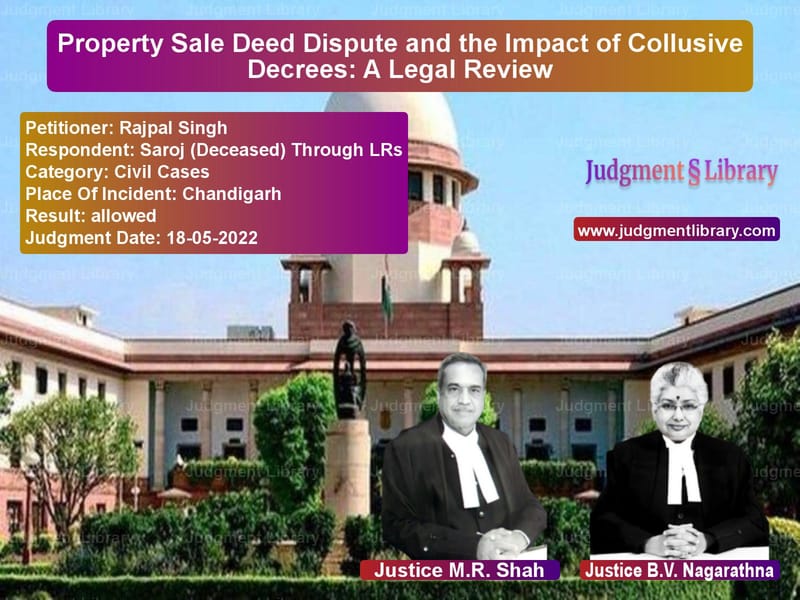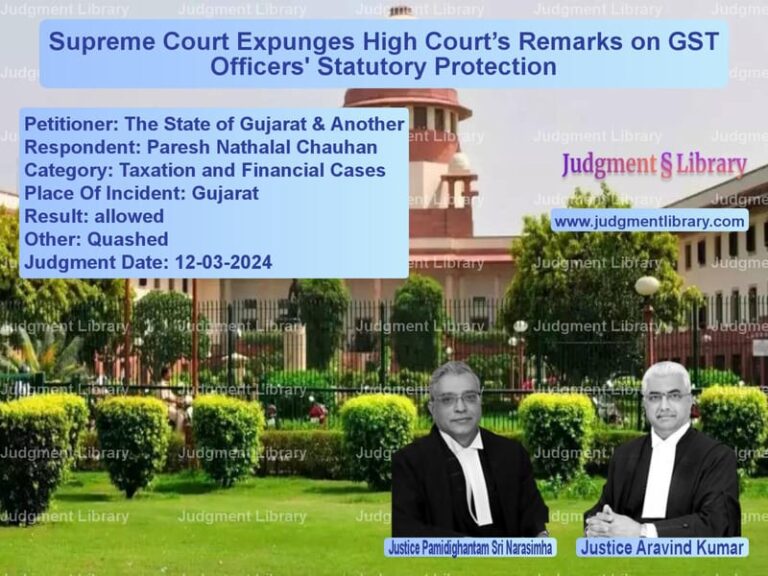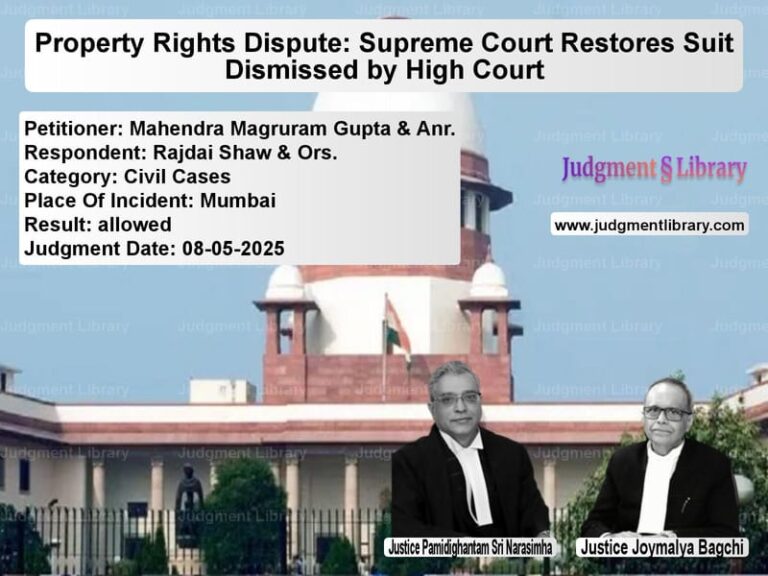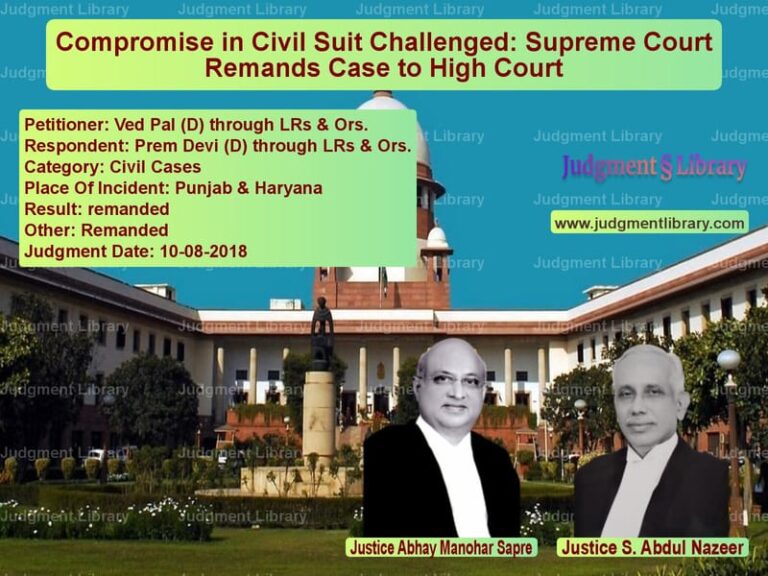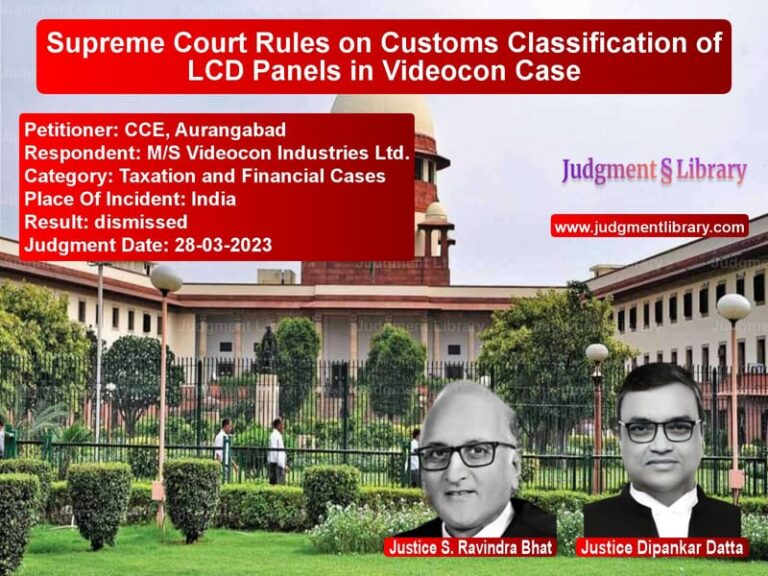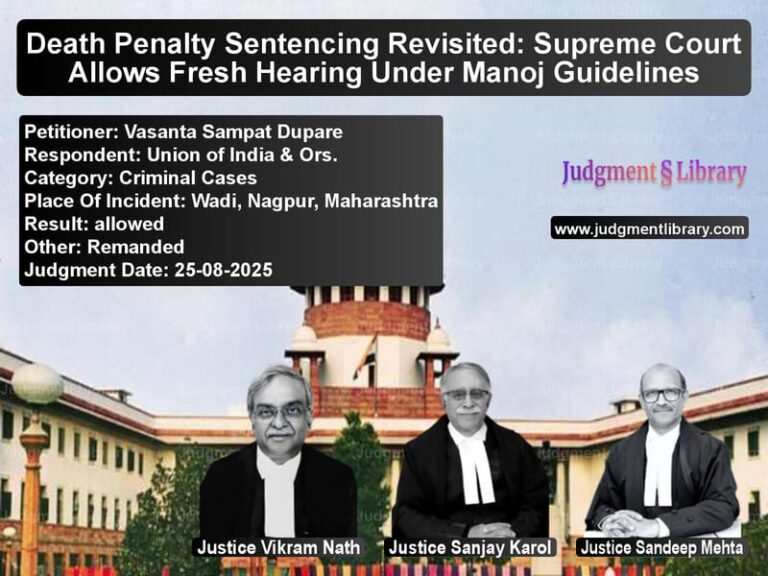Property Sale Deed Dispute and the Impact of Collusive Decrees: A Legal Review
This case concerns an appeal filed by Rajpal Singh, the appellant, challenging the judgment and order passed by the High Court of Punjab and Haryana in a second appeal. The appeal was filed against the decree passed by the First Appellate Court, which had set aside the decision of the Trial Court and ruled in favor of the respondent, Saroj, regarding the cancellation of a registered sale deed executed by her husband in favor of the appellant.
Petitioner’s Arguments
The appellant, represented by counsel Mr. Ankur Mittal, argued that the First Appellate Court had correctly set aside the Trial Court’s judgment. The appellant pointed out that he was the victim of a fraud orchestrated by the original plaintiff (Saroj) and her husband (defendant No. 2). According to the appellant, Saroj, along with her husband, obtained a collusive decree in Civil Suit No. 1643 of 1994, which was executed without his knowledge. The appellant further stated that despite this fraudulent decree, he had lawfully entered into an agreement to purchase the property in question from the original defendant, who was the true owner of the property at the time.
The appellant contended that after paying the full sale consideration and being placed in possession of the property, the appellant had cultivated and maintained the land for several years. The appellant emphasized that the sale deed executed in his favor in 1996 was a legitimate transaction and that the High Court erred in quashing the sale deed, thereby jeopardizing his right to possess the property.
The appellant also argued that the suit for cancellation filed by the original plaintiff was barred by the law of limitation. The appellant pointed out that the suit for cancellation of the sale deed was filed long after the expiration of the statutory limitation period, which is three years from the date the plaintiff had knowledge of the sale deed. The appellant requested that the appeal be allowed and the judgment of the First Appellate Court be restored.
Respondent’s Arguments
The respondent, Saroj, represented by counsel Mr. Rudra Pratap, argued that the High Court had rightly allowed the second appeal and quashed the decision of the First Appellate Court. The respondent emphasized that the registered sale deed executed in favor of the appellant was invalid because her husband, the original defendant, did not have the legal title to the property at the time of executing the sale deed. The respondent further contended that the First Appellate Court had correctly found that the appellant’s purchase of the property was based on a fraudulent agreement executed by the original defendant without the respondent’s knowledge or consent.
Moreover, the respondent argued that the sale deed in question was void due to the existence of the earlier collusive decree obtained by her in Civil Suit No. 1643 of 1994. She stated that this decree had been obtained in her favor by her husband’s admission of ownership of the property, but the appellant was never informed of the decree. The respondent maintained that the sale deed executed by her husband in favor of the appellant was invalid and should be canceled accordingly. Furthermore, the respondent argued that the suit for cancellation was not barred by limitation, as the suit sought the return of possession of the property, and the limitation period for such a claim was twelve years.
Court’s Analysis and Conclusion
The Supreme Court carefully examined the arguments from both sides and reviewed the legal implications of the case. The Court first considered the nature of the collusive decree obtained by the respondent in Civil Suit No. 1643 of 1994. The Court noted that the decree was obtained without contest by the original defendant (the respondent’s husband) and that the appellant was unaware of the decree at the time of the sale transaction. The Court observed that the appellant had acted in good faith by purchasing the property and paying the full sale consideration.
Read also: https://judgmentlibrary.com/supreme-court-restores-lok-adalat-compromise-in-family-property-dispute/
The Court also examined the issue of limitation and concluded that the respondent’s suit for cancellation of the sale deed was indeed barred by the law of limitation. The Court highlighted that the suit for cancellation of a sale deed must be filed within three years from the date the plaintiff gains knowledge of the deed, and since the sale deed was executed in 1996, the respondent’s suit filed in 2007 was beyond the prescribed time limit.
Additionally, the Court considered the argument regarding the appellant’s possession of the property. The Court acknowledged that the appellant had been in possession of the land since 1996 and had made efforts to cultivate and maintain the property. The Court also noted that the appellant’s name had been duly entered in the revenue records, which further affirmed his possession of the property. The Court emphasized that the respondent’s claim for the cancellation of the sale deed and possession of the property was unjustified due to the lapse of time and the failure to prove that the appellant had acted fraudulently in acquiring the property.
Final Decision
The Supreme Court allowed the appeal, quashing the judgment of the High Court and restoring the decision of the First Appellate Court. The Court concluded that the respondent’s suit for the cancellation of the sale deed was barred by the law of limitation and that the appellant’s possession of the property was lawful. The Court held that the appellant had acquired the property in good faith and was entitled to retain possession. The Court emphasized that the legal principles of limitation and possession must be respected, and the respondent’s claim for cancellation of the sale deed and restoration of possession was dismissed.
Petitioner Name: Rajpal Singh.Respondent Name: Saroj (Deceased) Through LRs.Judgment By: Justice M.R. Shah, Justice B.V. Nagarathna.Place Of Incident: Chandigarh.Judgment Date: 18-05-2022.
Don’t miss out on the full details! Download the complete judgment in PDF format below and gain valuable insights instantly!
Download Judgment: rajpal-singh-vs-saroj-(deceased)-thr-supreme-court-of-india-judgment-dated-18-05-2022.pdf
Directly Download Judgment: Directly download this Judgment
See all petitions in Contract Disputes
See all petitions in Property Disputes
See all petitions in Specific Performance
See all petitions in Judgment by Mukeshkumar Rasikbhai Shah
See all petitions in Judgment by B.V. Nagarathna
See all petitions in allowed
See all petitions in supreme court of India judgments May 2022
See all petitions in 2022 judgments
See all posts in Civil Cases Category
See all allowed petitions in Civil Cases Category
See all Dismissed petitions in Civil Cases Category
See all partially allowed petitions in Civil Cases Category

